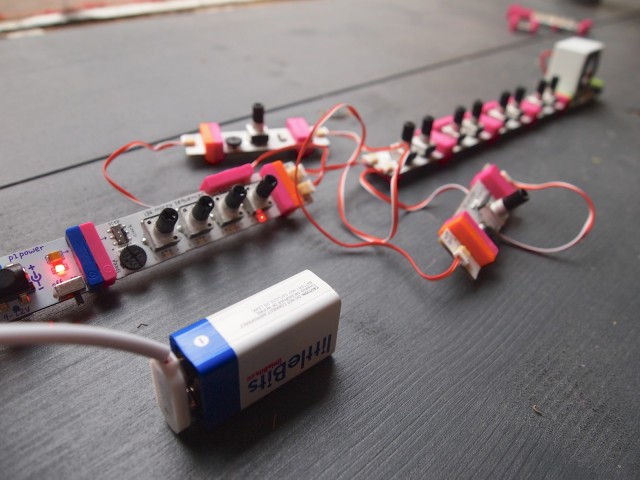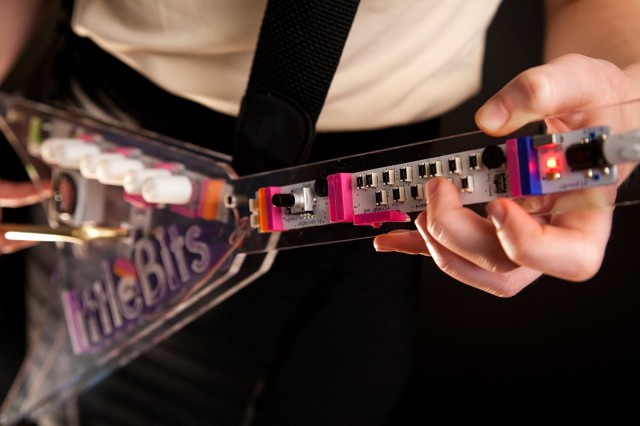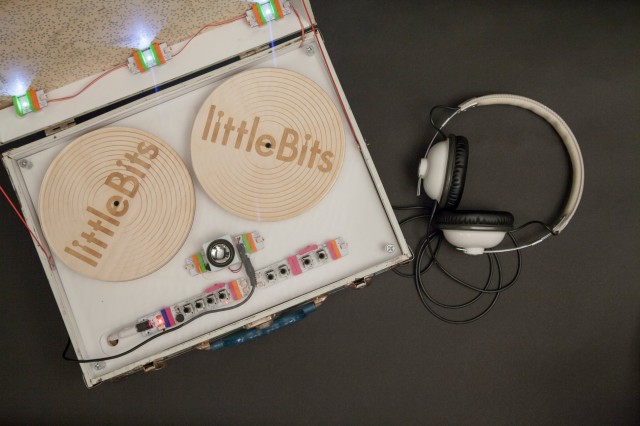Imagine if you could take apart your favorite recent KORG analog creations, chop it up into little blocks, and then snap them together with magnetic ease?
In other words, imagine if you could put together a KORG synth as easily as you did LEGO?
It’s every bit as much fun as you’d imagine. I’ve been testing the littleBits Synth Kit for a few days now. I’ve got some sounds for you here so you can hear some of what’s possible. (They’re Creative Commons-licensed, if anyone wants to try to sample them in a track; I know I’ll be working on that soon.)
I made a few one-take, all-live jams with my rig and recorded them. Have a listen:
All the tracks were recorded live with only light edits and no post-processing, directly into an iPad via Sonoma Wire Works‘ (very nice-sounding) GuitarJack and Sonoma StudioTrack.
In Etudes 1-3, you’ll hear some variations on a two-oscillator synth with (MS-20) filter, envelope, and delay. (Etude 3 makes use of the noise source for modulation.)
Etude 4 is an example of a frequency modulation setup.
Etude 5 uses the random oscillator for percussion.
These use the step sequencer, occasionally triggered from the keyboard.
For sound design and tinkering, in other words, these are great fun. The limitations can be inspiring. There’s something charming about using a tiny 4-step sequencer, about hunching over miniature boards with blinking lights. And all of this runs off a single 9V battery, in a set of modules that easily fit in a small bag. It’s good fun even before adding more modules (though more about that later).
The only disadvantages really have to do with the smallness of the components and the magnetic connections, and the fact that these modules are likely to make you hungry for more.
I wrote a full review for De:bug here in Germany; you get the choice of reading it in German or in English:
REVIEW: LITTLEBITS SYNTH KIT [English]
IM TEST: LITTLEBITS SYNTH KIT [Deutsch]
And I talk as well about how some of the tradeoffs here for rapid prototyping parallel those for LEGO.
I do think this is a big deal – for DIY, for open source hardware, and for the love of sound.
It’s funny to look back at the interview we did with littleBits founder Ayah Bdeir back in 2010, back when “open source hardware” wasn’t yet a buzzword, before Ayah got funding and awards and international press:
Summit Touts Open Source Hardware, Q+A with Co-Creators; Music Hardware?
As for music, well, make that question mark at the end an exclamation mark.
My guess is that these ideas will continue to become viral and widespread, as more people play with making their own hardware and more people make their own sound.
Each hit breeds more success. Monosynths have yielded more monosynths; analog effects and suitcase modulars and iPad apps and grid controllers have caused more musical inventions to appear, not fewer.
littleBits, by laying bare the guts of a synthesizer and letting even kids put it back together again, is a beautiful embodiment of the idea of DIY sound. The fact that its circuits and firmware will soon be open source makes that doubly true. Think of it not just as one solution to that desire to make, but a spark. As the whole landscape of experimentation with sound, the love of noise, continues to widen, the idea of musical invention as play is about to get a whole lot more popular.
Here’s Ayah in a new interview, with MAKE:
And Ayah and engineer Paul show off the system at MAKE Expand:
But let’s hear more music. littleBits has released the live concert footage from the launch party, with Nullsleep —
— “Seth” (the amazing duo of KORG’s Tadahiko Sakamaki and Tatsuya Takahasi —
— and Reggie Watts.
Finally, here’s a look at two of the projects the littleBits folks devised. The keytar amounts mainly to glueing the modules in place to transform them into an instrument – but on the plus side, you get to choose the features, and the result is more playable. The turntable cleverly makes big wheels to control the knobs. It’s nice to see something whimsical and inventive like this (photos courtesy littleBits):


